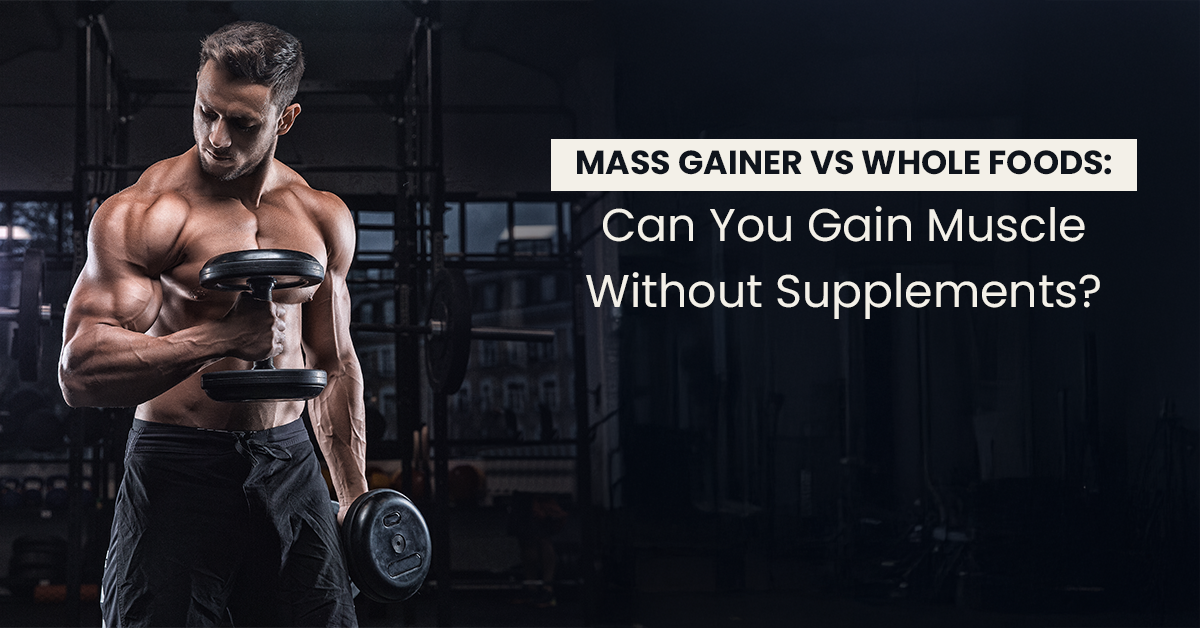

Published On 28 Oct 2025

Muscle gain is a common fitness goal, whether you’re a beginner or an experienced athlete. Nutrition plays a critical role in muscle development, and the market offers numerous options to help achieve your goals. Among these, mass gainers are popular supplements designed to provide high calories and nutrients in one convenient package.
However, some fitness enthusiasts prefer whole foods, relying on natural sources of protein, carbohydrates, and fats. This raises the question: “Can you gain muscle without supplements?
In this blog, we’ll explore the differences between mass gainers and whole foods, their benefits, and how you can build muscle naturally while optimizing your nutrition.
Muscle growth occurs when your body receives adequate protein, calories, and nutrients combined with resistance training. Key factors include:
Meeting these requirements can be achieved through supplements like mass gainers or by carefully planning whole food meals.
A mass gainer is a high-calorie supplement designed to provide a combination of protein, carbohydrates, fats, and sometimes added vitamins and minerals. Mass gainers are ideal for people who:
Benefits of Mass Gainers
Purchase Tip: For high-quality mass gainers, check out Kratoz Mass Gainer to support your muscle-building goals.
Whole foods are unprocessed or minimally processed foods that provide the necessary nutrients for muscle growth. While mass gainers offer convenience, whole foods offer quality nutrition and additional health benefits.
Best Whole Foods for Muscle Growth
Whole foods also provide fiber and other phytonutrients, which aid digestion and overall health, something most mass gainers lack.
| Aspect | Mass Gainer | Whole Foods |
|---|---|---|
| Convenience | Very convenient, ready to consume | Requires meal prep and planning |
| Calorie Content | High calories in one serving | May require large quantities to match calories |
| Nutrient Quality | Good macronutrients but limited micronutrients | Rich in micronutrients, fiber, and antioxidants |
| Cost | Can be expensive | Often more affordable per calorie |
| Suitability | Ideal for busy lifestyles or fast gain | Best for long-term health and sustainable gains |
Expert Insight: Mass gainers are excellent for quick calorie boosts, while whole foods offer holistic nutrition that supports overall health.
Yes, it is entirely possible to gain muscle without supplements. The key is strategic meal planning and ensuring a calorie surplus with adequate protein.
However, for individuals who struggle to eat enough calories due to lifestyle or high metabolic rate, mass gainers can help bridge the gap efficiently.
Pro Tip: You can combine whole foods with a high-quality mass gainer like Kratoz Mass Gainer for a flexible, effective muscle-building strategy.
Gaining muscle requires calories, protein, and consistent resistance training. While mass gainers provide a convenient, high-calorie solution, whole foods offer superior nutrition, fiber, and long-term health benefits.
Ultimately, the best approach may be a combination of both, allowing convenience and high-quality nutrition to work together.
Start your muscle-building journey today and explore options like Kratoz Mass Gainer to complement your whole food meals and achieve your fitness goals effectively.